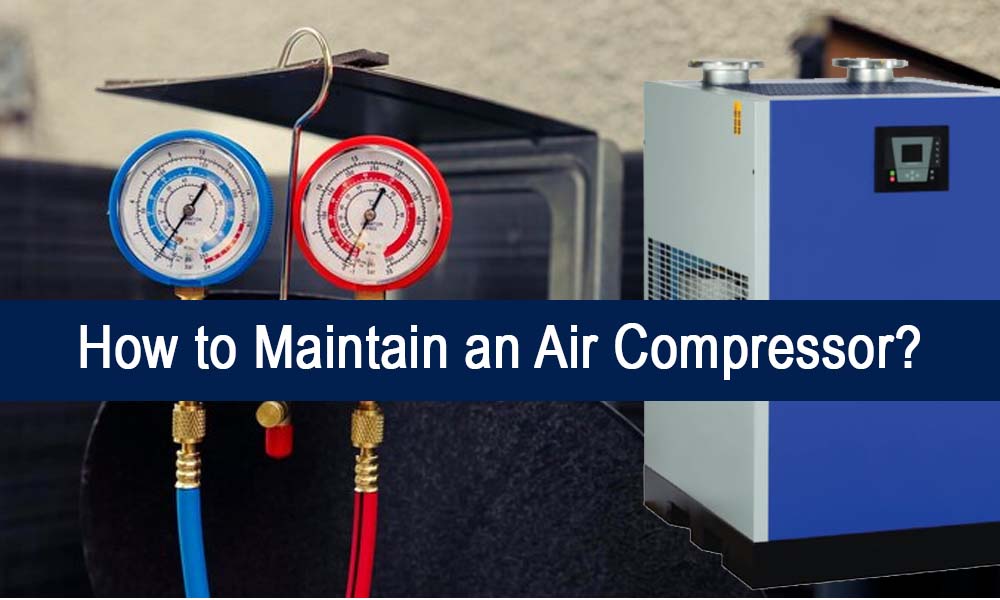Nothing is important as the maintenance of your air compressor to work for a long time without any problems. A maintained air compressor is more efficient on its work, less cost on repair bills and durable to the compressor lifecycle. If you are expert or user, it’s advisable always to practice regular maintenance.
Understanding Your Air Compressor Type and Components
Understanding your air compressor type and functionalities before maintenance is important to ensure proper care and prevent damage. Different compressor types have unique requirements, and knowing how components like the motor, tank, and valves function helps you identify potential issues and perform maintenance effectively.
Air Compressors Types
- Reciprocating Air Compressors: Mainly applicable in the small scale industries or trader’s markets.
- Rotary Screw Air Compressors: Rotary Screw is the most suitable type of industrial use since it has a continuous mode of operation and heavily loaded.
- Centrifugal Air Compressors: which is applied on the large scale jobs that involve large amount of production.
Important Parts to Monitor
- Motor: Motor is the main part of your compressor, it’s required regular checkup.
- Tank: Stores compressed air and must be corrosion-free.
- Valves: Control airflow and need to be clean and fully functional.
Daily Maintenance Tasks
- ➤ Checking Oil Levels: Check the oil regularly and add more if needed. Low oil levels can cause the compressor overheating and serious damage. Keeping it topped up ensures smooth and safe operation.
- ➤ Inspecting for leaks: Hearing hissing noises may indicate that you have a leak and are wasting energy. If you notice any leaks, deal with them right away to avoid efficiency issues.
- ➤ Draining the Moisture Trap: Moisture builds up in the tank over time. Draining it daily helps prevent rust and potential damage to your compressor.
Weekly Maintenance Tasks
- ➤ Cleaning the Filters:Dirty filters can reduce the efficiency of the air conditioner. Clean or replace the air filters every week to prevent issues with your compressor.
- ➤Inspecting Belts & Hoses: Look at your car’s belts and hoses for any signs of cracks or rasping. If your compressor is not working well, change the for better results.
- ➤Checking Safety Release Valves: Make sure the safety valves are working properly to prevent dangerous pressure build-up.
Monthly Maintenance Tasks
- ➤ Inspecting the Tank for Corrosion: Corrosion can weaken the tank and cause serious failures. Be sure to check both the interior and exterior regularly.
- ➤ Checking Pressure Gauges: Make sure gauges provide accurate readings to avoid overloading the system.
- ➤ Testing System Performance: Run the compressor and monitor performance to spot any irregularities.
Annual Maintenance Tasks
Replacing Oil and Filters
By changing the oil and filters, the engine remains in good condition as well as avoids buildup and gives the highest performance. Even this small level of maintenance helps so much in improving efficiency, and second, in keeping your compressor running for a long number of years.
Inspect Electrical Connections
Regularly inspection is important for electrical connections, as loose or frayed wires can lead to the malfunctions. Make sure those connections are secure and in good condition, helps prevent issues and keeps your compressor working smoothly.
Professional Servicing
Every issue that can’t be seen with the naked eye could be discovered earlier by a professional repairer rather than through regular checks. A mechanic familiar with air compressors can assist you in preventing costly repair or breakdowns by keeping it in good condition.
Tips for Long-Term Maintenance
Storing Your Compressor Properly
By keeping the compressor wrapped up in a dry and clean area, it is sheltered from dust and moisture. Storing it properly prevents it from getting damaged and keeping it in working condition for when you can use it.
Quality Parts and Accessories
Using the best quality parts & accessories helps to reduce destruction, it ensures that your compressor runs efficiently and lasts longer. By investing in top-qualities components, it helps to protects your equipment and enhances its overall performance.
Common Maintenance Mistakes to Avoid
- Ignoring small leaks
- Skipping oil changes
- Overloading the compressor
Troubleshooting Common Issues
➥ Low Pressure Output: Check for leaks or clogged filters.
➥ Overheating: Ensure proper ventilation and check oil levels.
➥ Strange Noises: These could indicate worn parts or loose components.
➥ Safety Considerations: When using pressured air always practice security and wear protective clothing also do as the manufacturer has advised so as to avoid the danger. Minimizing risks makes it easier to prevent mishaps and developing a safe climate in which to work is important.
Benefits of a Well-Maintained Compressor
- Long Life: Proper care extends the machine’s life.
- Better Efficiency: Save energy and achieve consistent performance.
- Reduced Repair Costs: Avoid costly and unnecessary maintenance.
Proper maintenance helps an air compressor work optimally and last longer. Making sure your machine is well-maintained stops many usual issues and helps it work whenever you need it most.
FAQs
How often should I inspect my air compressor’s oil level?
Oil level should be keep checking on daily basis to avail consistent and optimal performance of the automobiles.
Can we use any type of oil for air compressor?
It’s important always use the oil type recommended by the manufacturer.
What should I do if my compressor overheats?
Switch it off, wait for some time, and look for blockages while refilling the oil level as well.
Is it necessary to hire a professional for Compressor maintenance?
Although simple services may be performed on your own, at least once a year professional cleaning of the equipment is recommended.


